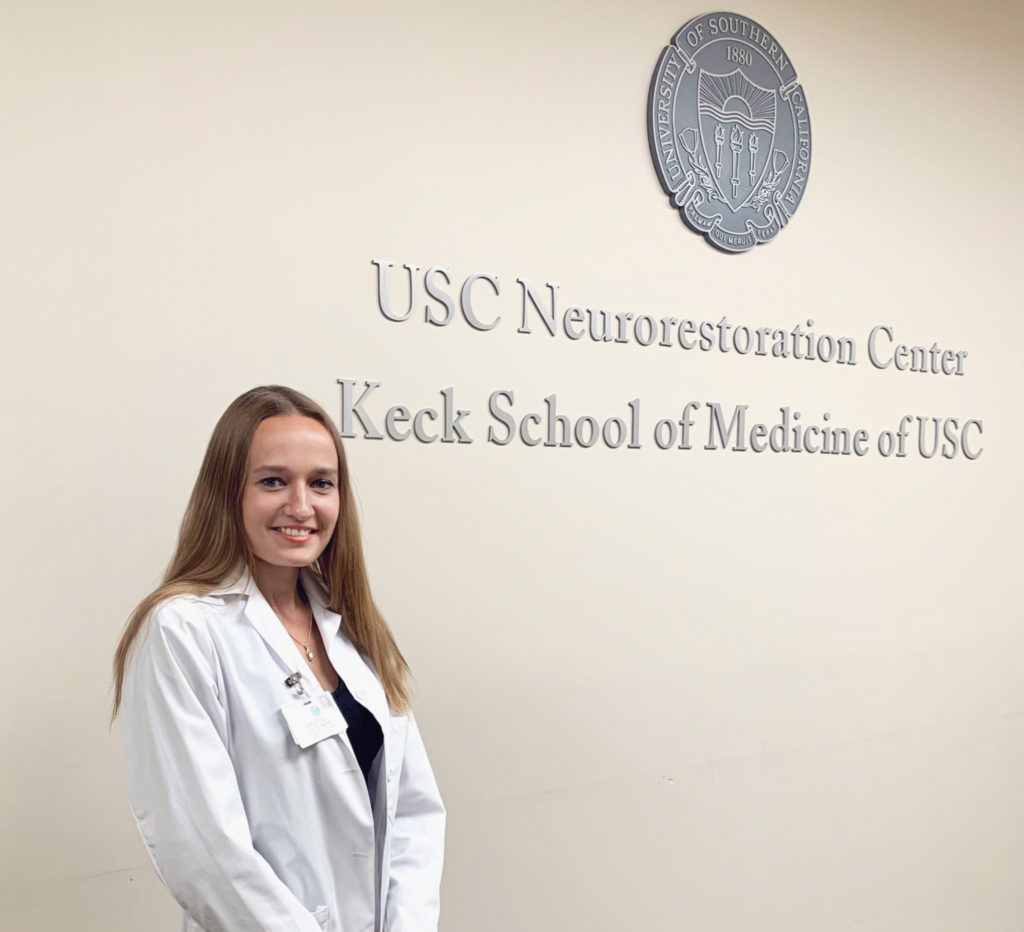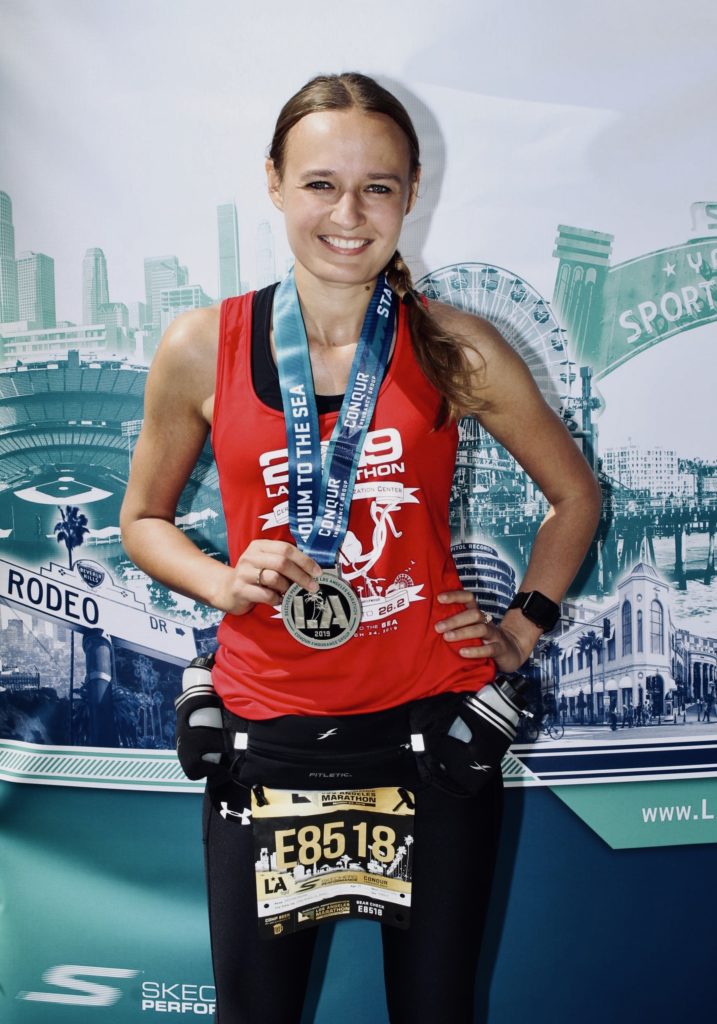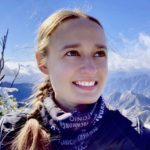By Kristine Ravina
 I am an international medical graduate from Latvia currently having the honor to pursue my research interests in cerebrovascular neurosurgery at the USC Center for Neurorestoration under the mentorship of Dr. Jonathan Russin. Early on after joining the USC Neurorestoration center, I learned the great dedication and connection Dr. Russin has with his patients reaching well beyond surgery and clinical care. The Neuro ICU-to-26.2 LA Marathon fundraising event inspired by the unique story of Kathy Nguyen has been one of the greatest highlights during my time at the USC Center for Neurorestoration so far. Not only was it heartwarming to see Kathy and other survivors and their families celebrating their great perseverance and courage together with their doctors, it meant a lot for me personally. Given that aneurysm rupture is fatal in nearly half of the cases and more than two thirds of the survivors suffer permanent neurologic deficit, it is truly amazing to know that there are ruptured brain aneurysm patients who not only survive this devastating misfortune but take it to a whole new level. They serve as a reminder that it is possible to take on new challenges and inspire others to live, give back, raise awareness, support research and run for those who cannot in hopes of improving the grim statistic in the future. These thoughts have followed me throughout my marathon practice. Kathy’s example has been a great inspiration for me to overcome my limits and succeed in the way I had never imagined. With having basically no experience in running, I was able to drastically improve my lifestyle and prepare myself for the full marathon in less than four months. Still, this physical challenge was nothing compared to what these patients had gone through and I can only admire their perseverance and courage to run and share their deeply moving stories.
I am an international medical graduate from Latvia currently having the honor to pursue my research interests in cerebrovascular neurosurgery at the USC Center for Neurorestoration under the mentorship of Dr. Jonathan Russin. Early on after joining the USC Neurorestoration center, I learned the great dedication and connection Dr. Russin has with his patients reaching well beyond surgery and clinical care. The Neuro ICU-to-26.2 LA Marathon fundraising event inspired by the unique story of Kathy Nguyen has been one of the greatest highlights during my time at the USC Center for Neurorestoration so far. Not only was it heartwarming to see Kathy and other survivors and their families celebrating their great perseverance and courage together with their doctors, it meant a lot for me personally. Given that aneurysm rupture is fatal in nearly half of the cases and more than two thirds of the survivors suffer permanent neurologic deficit, it is truly amazing to know that there are ruptured brain aneurysm patients who not only survive this devastating misfortune but take it to a whole new level. They serve as a reminder that it is possible to take on new challenges and inspire others to live, give back, raise awareness, support research and run for those who cannot in hopes of improving the grim statistic in the future. These thoughts have followed me throughout my marathon practice. Kathy’s example has been a great inspiration for me to overcome my limits and succeed in the way I had never imagined. With having basically no experience in running, I was able to drastically improve my lifestyle and prepare myself for the full marathon in less than four months. Still, this physical challenge was nothing compared to what these patients had gone through and I can only admire their perseverance and courage to run and share their deeply moving stories.
 In only a year and a half at the USC Center for Neurorestoration so far, the dynamic and productive research environment allowed me to contribute to our team consisting of neurosurgery residents and fellows with 12 first author and more than 20 co-author contributions to various research projects and publications. Being able to learn on a daily basis, to study surgical approaches and outcomes, to share ideas and see them develop into something truly meaningful for the research and healthcare community has reached well beyond what I expected before starting my work here. I believe that the knowledge no less than happiness is only real when shared. Thus, it is crucial to spread our research findings through publications, talks and presentations to the world-wide neurosurgical community to make a change and improve patient care. This would not be possible without the support from the patients and their families and Dr. Russin’s dedication to innovation in finding ways to improve neurosurgical care. A novel approach in graft vasospasm prevention in cerebrovascular bypass, advanced surgical techniques and intraoperative blood flow analysis, and building of the cerebrovascular tissue bank are some of the ongoing projects with great potential to aid in the treatment and understanding of complex cerebrovascular pathologies including aneurysms, stroke and moyamoya disease.
In only a year and a half at the USC Center for Neurorestoration so far, the dynamic and productive research environment allowed me to contribute to our team consisting of neurosurgery residents and fellows with 12 first author and more than 20 co-author contributions to various research projects and publications. Being able to learn on a daily basis, to study surgical approaches and outcomes, to share ideas and see them develop into something truly meaningful for the research and healthcare community has reached well beyond what I expected before starting my work here. I believe that the knowledge no less than happiness is only real when shared. Thus, it is crucial to spread our research findings through publications, talks and presentations to the world-wide neurosurgical community to make a change and improve patient care. This would not be possible without the support from the patients and their families and Dr. Russin’s dedication to innovation in finding ways to improve neurosurgical care. A novel approach in graft vasospasm prevention in cerebrovascular bypass, advanced surgical techniques and intraoperative blood flow analysis, and building of the cerebrovascular tissue bank are some of the ongoing projects with great potential to aid in the treatment and understanding of complex cerebrovascular pathologies including aneurysms, stroke and moyamoya disease.
I am truly grateful for this opportunity to be part of the USC Center for Neurorestoration which has been a great experience of learning and professional as well as personal growth. Moreover, I am grateful to the patients, their families and anyone who sees value in our work and support our mission. It has been a great honor for me to be part of the Neuro ICU-to-26.2 LA Marathon fundraising event still in what I think is its early stage. Having witnessed Kathy’s and Dr. Russin’s wholehearted efforts in raising the awareness, I know it will greet even more runners, supporters and survivors in future. I look forward to further supporting the USC Center for Neurorestoration and participating in future marathon fundraising events.




Kristine Ravina
Kristine was born and raised in Latvia, a small country by the Baltic Sea in Northern Europe. She completed her medical studies at Riga Stradins University in Riga, Latvia. After finishing medical school in 2015, she completed a 2-year post-doctoral fellowship in Neuroscience at Stanford University, where she investigated cellular and molecular targets for the treatment of ischemic stroke using animal models. Kristine currently works as a Neurosurgery Research Associate at University of Southern California Neurorestoration Center. Her research is focused on innovations in vascular neurosurgery and drug resistant epilepsy under the mentorship of Dr. Jonathan Russin. Kristine is planning to apply for residency training in Neurosurgery in the United States to fulfill her goal of becoming an academic vascular neurosurgeon. In her spare time Kristine enjoys hiking, mountaineering and trail running.




